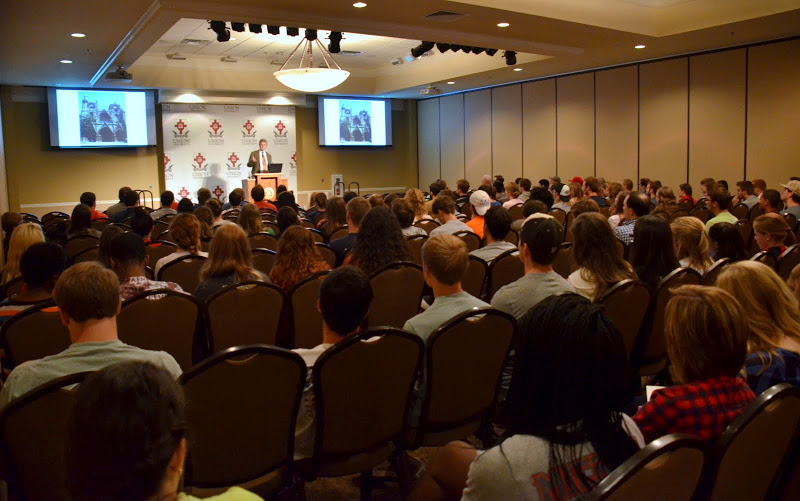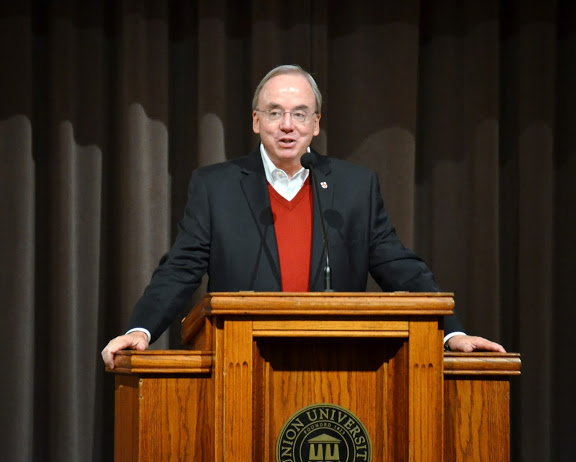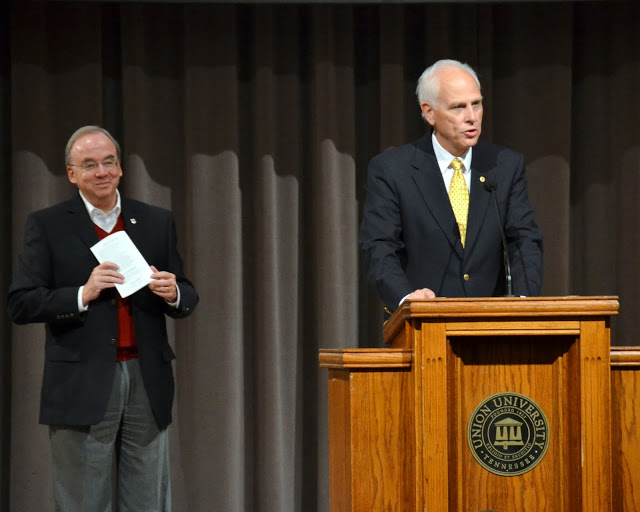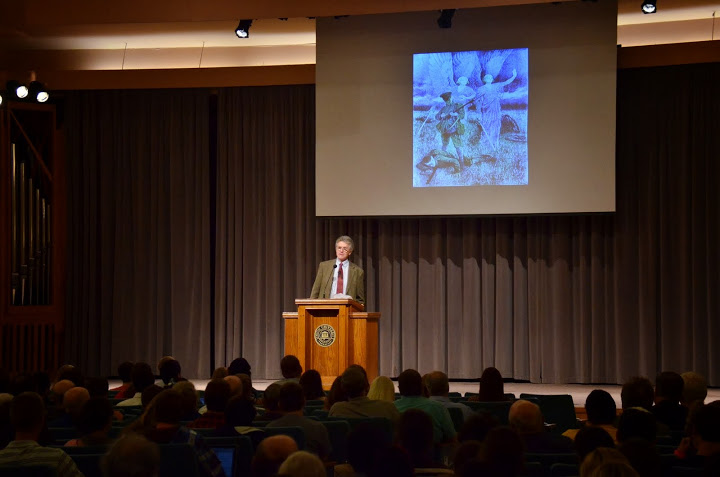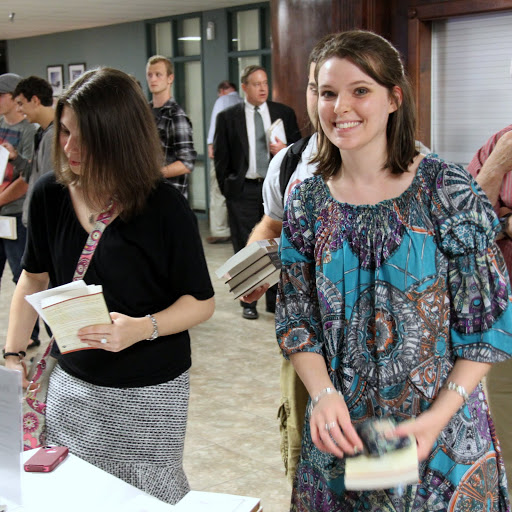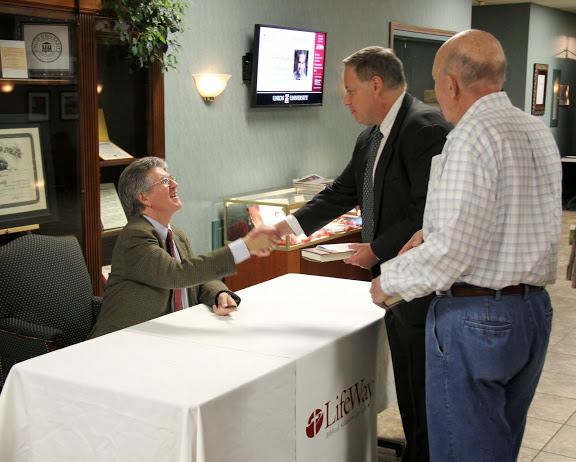Oct 1, 2013 -
Philip Jenkins, Distinguished Professor of History at Baylor University and a prize-winning author, was the Carls-Schwerdfeger History Lecturer at Union University on October 1, 2013. He delivered two lectures that involved the history of Christianity.
In the afternoon, Jenkins spoke on “The Lost History of Christianity.” He pointed out that even while the Christian church was spreading through Europe in its early history it was also advancing in Asia and Africa. Focusing much of his talk on Eastern Christianity, he stated that there were more Christians in Asia in 1000 A. D. than in Europe. In fact, during most of the Middle Ages the great centers of Christianity were located in the Middle East and Asia. The great turning point for Christianity in the East came in the fourteenth century, when the world suffered a period of global cooling. The change in climate contributed to shorter growing seasons, less food, illness, plague, and population loss. People used religious minorities as scapegoats for their suffering; as a result, Christianity was destroyed in China and uprooted in the Middle East. The number of people practicing Christianity in these regions quickly dropped to a very small percentage of their total populations. By 1400, the world largely reflected the traditional image we have of Christianity as a Western religion with a smattering of outliers in the East. Some 175 people attended Jenkins’s presentation.
Jenkins’s evening lecture was titled “From Angels to Armageddon: The First World War as a Global Religious Revolution.” Speaking to more than 625 attendees, Jenkins argued that the conflict was a holy war where people regularly heard about angels, crusades, miraculous crosses, visions of the Virgin Mary, and an approaching apocalypse. Some clergymen preached that soldiers dying for the cause of the Allies would immediately enter into paradise. Religious ideas were prevalent in wartime propaganda on both sides. By 1917, with millions dead from the war and people looking for a way out, many saw signs of the apocalypse when British troops occupied Jerusalem and fought in the battle of Armageddon. German Protestants portrayed Martin Luther as a messianic figure that year at a celebration in Wittenberg of the 400th anniversary of the Reformation, and Portuguese Catholics who gathered at Fatima on an appointed day in 1917 claimed to have seen a miracle that announced the return of the Virgin Mary. In addition, numerous people believed that Biblical prophecy was fulfilled in late 1917, when the British government issued the Balfour Declaration allowing Jews to return to Palestine. Jenkins stated that the war had long-term transformational effects on both Judaism and Christianity. For the Jews, the war was pivotal in the creation of the state of Israel. In the case of Christianity, it caused theologians like Karl Barth, for example, to challenge the liberal theology of the day by calling for a return to the fundamental values of the Bible. It was also during the war that the mass conversion of Africans to Christianity began.
Jenkins concluded the evening with a book signing, where copies of the following monographs were available for purchase: The Last Christendom: The Coming of Global Christianity (Third Edition); Laying Down the Sword: Why We Can’t Ignore the Bible’s Violent Verses; and The Lost History of Christianity: The Thousand-Year Golden Age of the Church in the Middle East, Africa, and Asia – and How It Died.
Participants at a dinner at Dr. Stephen Carls's home in honor of Dr. Philip Jenkins, the 2013 Carls-Schwerdfeger History Lecturer, join together for a photo on September 30, 2013. They are: (front row, left to right) Nancy Thomas, Becky Lindley, and Dr. Elizabeth Jenkins; (back row, left to right) Dr. David Thomas, Dr. Terry Lindley, Dr. Philip Jenkins, Dr. Henry Allen, Dr. Keith Bates, and Dr. Stephen Carls. Dr. Alice-Catherine Carls, the evening's hostess, took the photo.
Harbert Alexander (left) stands with Drs. Philip and Elizabeth Jenkins near the Rockabilly Music Museum in Jackson on October 1, 2013. Alexander gave them and Dr. Stephen Carls a tour of Jackson that included a visit to a Civil War display at the Carnegie Library and a tour of the Bemis Theater/Auditorium.
Dr. Stephen Carls introduces Dr. Philip Jenkins, the 2013 Carls-Schwerdfeger History Lecturer, at Jenkins's afternoon talk about "The Lost History of Christianity" on October 1. Photo by Morris Abernathy
Dr. Philip Jenkins lectures about "The Lost History of Christianity" at Union University on the afternoon of October 1, 2013. Jenkins was the 2013 Carls-Schwerdfeger History Lectureship speaker. Photo by Morris Abernathy
A large crowd attends Dr. Philip Jenkins's lecture about "The Lost History of Christianity" on the afternoon of October 1, 2013. Jenkins was the 2013 Carls-Schwerdfeger History Lecturer. Photo by Morris Abernathy
Attendees at a dinner in honor of Dr. Philip Jenkins, the 2013 Carls-Schwerdfeger History Lecturer, enjoy food and conversation together. They are: (at the head table, going clockwise, starting on the left ) Dr. Hal Poe, Dr. Elizabeth Jenkins, Dr. Philip Jenkins, Dr. Gene Fant, Dr. John Netland, Dr. Terry Lindley, Dr. Keith Bates, Dr. David Thomas (back to camera), and Dr. James Patterson (back to camera).
Attendees at an October 1 dinner in honor of Dr. Philip Jenkins, the 2013 Carls-Schwerdfeger History Lecturer, enjoy food and conversation together. They are: (starting on the left, going clockwise) Phi Alpha Theta President Gracie Wise, Phi Alpha Theta Vice President Charles Snow, Paula Hatcher, Dr. Alice-Catherine Carls, Dr. Taylor Worley (back to camera), and Dr. Ray Van Neste (back to camera).
Don Roe (left to right), Kyle Williams, and Robert Briley pause for a photo at a dinner in honor of Dr. Philip Jenkins, the 2013 Carls-Schwerdfeger History Lectureship speaker.
Dr. Stephen Carls (left) shakes hands with Dr. Philip Jenkins after presenting him with two books edited by Union President David S. Dockery. The presentation of the books took place at a dinner in Jenkins's honor on October 1, 2013.
Dr. Philip Jenkins, the 2013 Carls-Schwerdfeger History Lecturer, responds to a question at a dinner in his honor on October 1, 2013.
Dr. Keith Bates (left) and Dr. David Thomas listen to Dr. Philip Jenkins, the 2013 Carls-Schwerdfeger History Lecturer, answer a question during a dinner in his honor on October 1.
An ad featuring Dr. Philip Jenkins appears on a flat-screen high-definition television in Union University's Penick Academic Complex on October 1, 2013.
Union University President David S. Dockery welcomes more than 625 attendees to the Carls-Schwerdfeger Lectureship on the evening of October 1, 2013. Photo by Morris Abernathy
Dr. Stephen Carls (right) tells attendees at the Carls-Schwerdfeger History Lectureship on the evening of October 1, 2013, of his deep gratitude to Union president David S. Dockery (left) for the latter's support of the lectureship since its inception 17 years ago. Photo by Morris Abernathy
Historian Philip Jenkins speaks to a crowd of over 625 people about "From Angels to Armageddon: The First World War as a Global Religious Revolution" on October 1, 2013. Photo by Morris Abernathy
Historian Philip Jenkins lectures about "From Angels to Armageddon: The First World War as a Global Religious Revolution" as the Carls-Schwerdfeger History Lecturer on October 1, 2013. Photo by Matt McDaniel
Phi Alpha Theta alumnae Caitlin Roach (left) and Savannah German purchase books by Dr. Philip Jenkins during a book signing that followed Jenkins's evening lecture on "From Angels to Armageddon: The First World War as a Global Religious Revolution" on October 1, 2013.
Dr. Philip Jenkins (left) shakes hands with Dr. Henry Allen during a book signing after Jenkins's evening lecture on October 1 as the 2013 Carls-Schwerdfeger History Lecturer. Union University alumnus James Allison is on the right.





